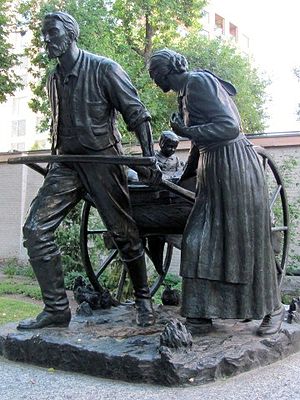
Back رواد عربة اليد المورمونية Arabic Mormonaj manĉaropioniroj EO Pioneros de carros de mano Spanish پیشگامان ارابهران مورمون FA Pionniers mormons en charrettes à bras French Pionieri mormoni con carretto a mano Italian 摩爾門手推車先驅者 Chinese

The Mormon handcart pioneers were participants in the migration of members of the Church of Jesus Christ of Latter-day Saints (LDS Church) to Salt Lake City, Utah, who used handcarts to transport their belongings.[1] The Mormon handcart movement began in 1856 and continued until 1860.
Motivated to join their fellow church members in Utah, but lacking funds for full teams of oxen or horses, nearly 3,000 Mormon pioneers from England, Wales, Scotland and Scandinavia made the journey from Iowa or Nebraska to Utah in ten handcart companies. The trek was disastrous for two of the companies, the Willie and Martin companies.[2] Both started their journey dangerously late in 1856 and were caught by heavy snow and severe temperatures in central Wyoming. Despite a dramatic rescue effort, more than 210 of the 980 pioneers in these two companies died along the way. John Chislett, a survivor, wrote, "Many a father pulled his cart, with his little children on it, until the day preceding his death."[3]
Although only about 5 percent of the 1846–1868 Latter-day Saint emigrants made the journey west using handcarts,[4] the handcart pioneers have become an important symbol in LDS culture, representing the faithfulness and sacrifice of the pioneer generation. They continue to be recognized and honored in events such as Pioneer Day, church pageants, and similar commemorations.
- ^ Roberts, David (Fall 2008), "The Awful March of the Saints", American Heritage
- ^ Hartley, William G. (1994), "Handcart Companies", Utah History Encyclopedia, University of Utah Press, ISBN 9780874804256, archived from the original on March 21, 2024, retrieved May 7, 2024
- ^ Hafen and Hafen (1981), p. 102.
- ^ "5 Things We Learn from Database of Mormon Pioneers - Church News and Events".